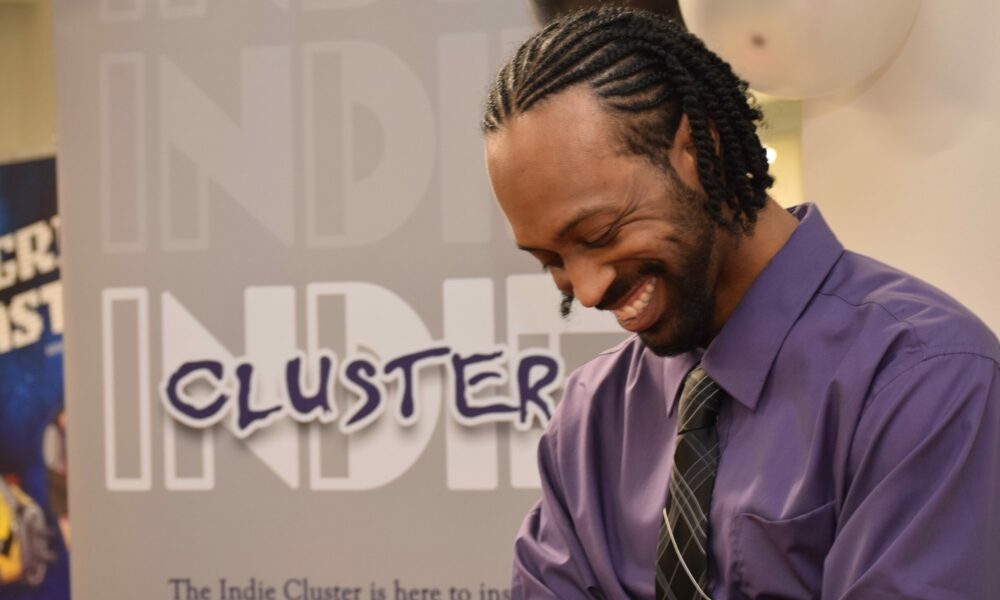

Today we’d like to introduce you to Ron Jones.
Hi Ron, can you start by introducing yourself? We’d love to learn more about how you got to where you are today?
I’ve always been a creative and grew up in an entrepreneurial home. Thinking outside the box was a must as I was raised to believe I could do anything I wanted. So as you could imagine, I wanted to do everything. I had interests in film, fashion, writing, DJ’ing, and a few other things. However, the career path I wanted the most was designing video games. Fortunately, The Art Institutes had a booth at my high school’s college fair. Not only did that make me realize I could make games for a living, they gave me the chance to attend a school with a diverse set of creative courses. As I grew into myself, I also grew into the Atlanta community. As games and digital entertainment became the industry of the future, I made a name for myself here locally. After graduation however, the job market hadn’t caught up to the accessibility of game development. The boom of the independent space was brewing as others had the same struggles as I did. I continued working on my games, art, and comics for a few years. Making the best of life and trying to collect resources, contacts, and influencers for the future. The game industry was growing at such a rapid pace that it was way too much for developers to keep up with and be sustainable, at least while maintaining the freedom to make a game their way. With the help of the Georgia Game Developers Association, The Indie Cluster was founded as a solution. We first provided less expensive conference rates by taking advantage of group discounts. Announcing ourselves to the world as a collective that stood out as the place to be. We’ve been able to scale the organization to offer monthly services to indies including quality assurance support and social media management. The Cluster is a proud partner of local schools and nonprofits, teaching game development and increasing access into the industry for marginalized communities. Our new website handles our membership model, offering tiered benefits for our supporters. We’re super excited to have found a place in this community, a community that treats each other like family.
Alright, so let’s dig a little deeper into the story – has it been an easy path overall and if not, what were the challenges you’ve had to overcome?
Perhaps the first big trial by fire I had to go through was being a starving artist for a few years. Really hitting rock bottom at times gave me a much better appreciation for life, happiness, the people around me, and those that persevered through their struggle. That time in my life was focused on staying grounded as I knew I wouldn’t be down for long. With the Indie Cluster, we had a number of growing pains, mainly due to the fact that we weren’t defined in the beginning. So with a market that changed everyday, we experimented with shows, events, and a podcast to see what the world needed and what we could offer. Finding our groove with QA really came out of devs needing feedback during the pandemic. With physical events canceled, smaller developers got to save that money but lost an opportunity for growth having people playtest their project. Adaptability was probably our most important skill to survive for as long as we have. Now that we have an internal team, we can be even more flexible and focus on the growth of our members.
As you know, we’re big fans of The Indie Cluster. For our readers who might not be as familiar what can you tell them about the brand?
The Indie Cluster is a platform providing opportunities, resources, and services centered around supporting indie game developers. We focus on quality assurance testing, discoverability, community building, and curating a traveling booth for our games. As our digital future demands more interactive experiences, sustainability is crucial for these small businesses. We’ve created a modular studio for our members, allowing each developer to focus on their game while still staying connected and succeeding together!
Our mission is to never let a passion project die because of a lack of resources. The developers we work with, retweet, share, and support are all so inspiring. It brings us joy to be a part of their growth or even be close enough to witness it. These future creative rockstars have the tools to design what success means to them. Yet being on the corner of art and tech, they often face outside challenges that prevent them from doing what they love. That’s where we want to come in. Giving professional grade feedback, building their brand, engaging with their community, and keeping a solid network of influencers so they don’t have to. All other game hubs are just websites, we provide on-demand services. I’m so grateful for the team that we’ve been able to put together. I’m proud of the success stories of our indie alumni. We’ll never forget the heart of everyone that has supported or partnered with us. Building these bridges are worth it just to see someone light up to discover a great game.
Risk taking is a topic that people have widely differing views on – we’d love to hear your thoughts.
Not everyone can take large risks all the time. So many people are affected by forces they can’t control. I was blessed enough to have a safety net in my family, my peers, even my other interests. I credit that net to contributing being able to fail fast, get back up, and try something new before others around me. However, taking risks are a big part of life. Walking outside, applying for schools, spending your money at one place instead of the other. The thing you learn is the less chances you take in life, the less agency you have over it. Without being reckless, you can take a calculated risk to reap a well-earned reward. The decisions you make outside your comfort zone will directly correlate to the fruits you encounter. People will always say starting a business is a risk, and it is. However, so is trading your time for money long term as you settle for making someone else’s dream come true. An answer to why the CEO gets paid the most or does the least amount of work is usually because they take the most risks. These risks can include not getting paid first or sometimes at all, steering the company’s growth when you don’t know what you’re doing, and being the leader and face that the world will associate with your business. If any little thing goes wrong, it’s your fault, your responsibility, not the person you hired that made a mistake. I think it’s a big risk to not grow and stay stagnate, as we can’t stop the world from changing around us. I would advise for anyone to go somewhere new or try something they’ve always wanted to, but know it’s a risk. That’s okay, some risks are worth going all in on.
Contact Info:
- Email: IndieClusterATL@Gmail.com
- Website: https://IndieCluster.com
- Instagram: https://www.instagram.com/indieclusteratl
- Facebook: https://facebook.com/indieclusteratl
- Twitter: https://twitter.com/indieclusteratl
- Other: https://twitch.tv/indieclusteratl






Image Credits:
Georgia Game Developers Association













